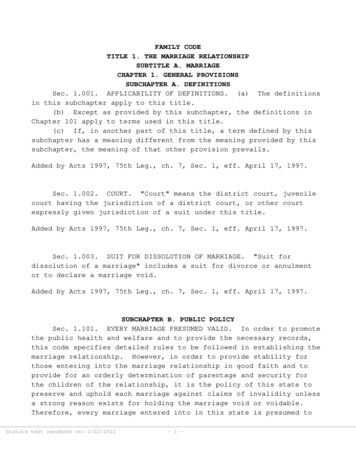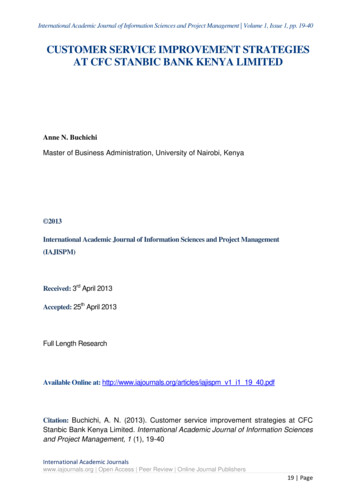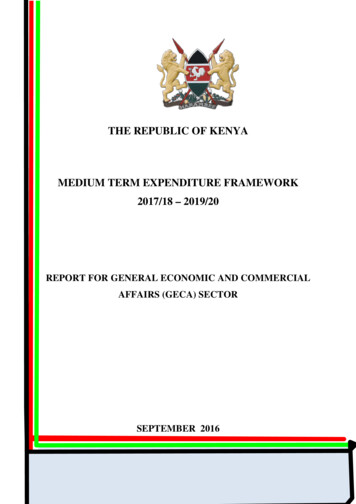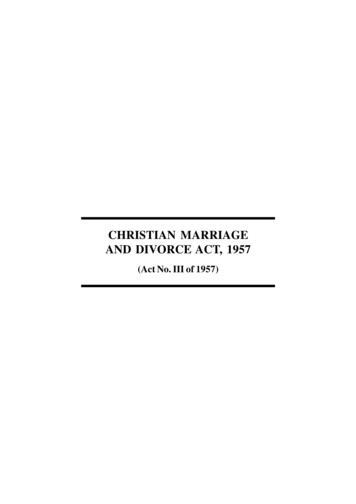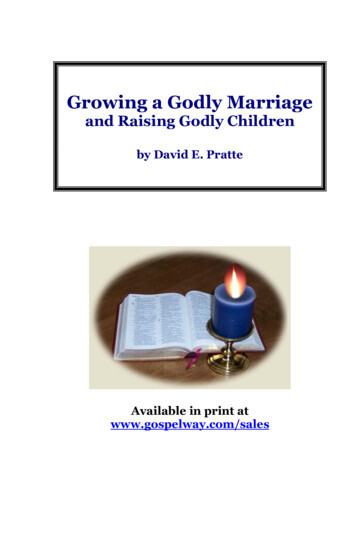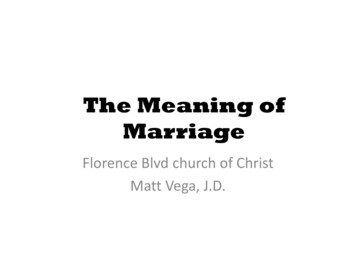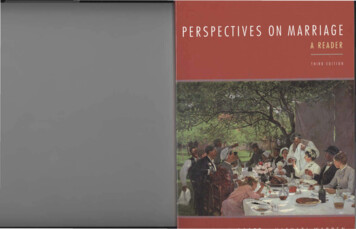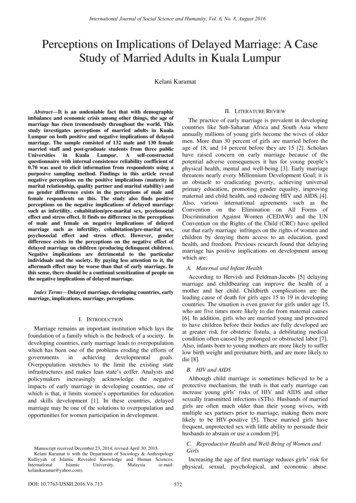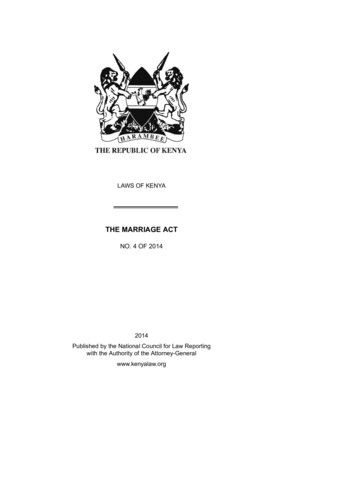
Transcription
LAWS OF KENYATHE MARRIAGE ACTNO. 4 OF 20142014Published by the National Council for Law Reportingwith the Authority of the Attorney-Generalwww.kenyalaw.org
MarriageNo. 4 of 2014NO. 4 OF 2014MARRIAGE ACTARRANGEMENT OF SECTIONSPART I – PRELIMINARYSection1. Short title2. ART II – GENERAL PROVISIONSMeaning of marriageMinimum ageWitnesses to a marriageKinds of marriagesDeclaration of marriage registration areasConversion of marriagesSubsisting marriagesProhibited marriage relationshipVoid marriagesVoidable marriagesSpouses and the law of tortArrangement to live apartRights of widow and widowersDuration of marriage17.18.19.20.21.22.23.PART III – CHRISTIAN MARRIAGESChristian marriagesInterpretation of PartObjection to give a notice of intention to marryObligations of the church minister in relation to objectionSigning of the marriage certificateRecognition of foreign marriages as Christian marriages in KenyaChristian marriages at the embassy, high commission or consulate24.25.26.27.28.29.30.31.32.PART IV – CIVIL MARRIAGECelebration of civil marriagesNotice of intention to marryPublication of notice of intention to marryObjection to a notice of intention to marryObligation of the person in charge of a place where a marriage is to becelebrated in relation to objectionsDetermination of objectionEffect of an appeal to an objectionAppeal proceedingsCertificate of no impediment3
No. 4 of 201433.34.35.36.37.Marriage40.41.42.Power of Registrar to dispense with noticeEffect of appeal on the findings of an objectionContraction of civil marriageCertificate of no impedimentCivil marriages at the Kenyan embassy, high commission or consulate fornon-Kenyan citizensCivil marriages in foreign countriesCivil marriages at the Kenyan embassy, high commission or Consulate forKenyan citizensRecognition of foreign marriages as civil marriages in KenyaAppointment of diplomatic staff as celebrants of marriageDuty to register marriages43.44.45.PART V – MARRIAGE UNDER CUSTOMARY LAWGoverning law for Customary marriageNotification of Customary marriageContents of notification of Customary marriage46.47.PART VI – HINDU MARRIAGEApplication of this PartPersons authorised by Registrar to solemnize Hindu marriages48.49.PART VII – MARRIAGE UNDER ISLAMIC LAWApplication of Islamic lawOfficiation of Islamic marriages50.51.52.PART VIII – APPOINTMENT OF REGISTRAROF MARRIAGES AND MARRIAGE OFFICERSAppointment of Registrar and Marriage officersAppointment of marriage officers in foreign countriesLicensing ministers of faith53.54.55.56.57.58.59.60.61.62.63.PART IX – REGISTRATION OF MARRIAGESRegistration of Christian marriagesRegistration of civil marriagesRegistration of Customary marriageRegistration of Hindu marriagesRegistration of Islamic marriagesRegistration of marriages contracted abroadEvidence of marriageCopies of decrees of annulment and divorce to be sent to RegistrarRegistration of foreign annulments and divorcesEndorsement of marriage registersCorrection of errors64.PART X – MATRIMONIAL DISPUTESAND MATRIMONIAL PROCEEDINGSDissolution of a Christian marriageMediation of disputes in Christian marriages38.39.4
Marriage65.No. 4 of 201473.74.75.Grounds for dissolution of a Christian marriageDissolution of a civil marriageRight to petition for separation or divorceDismissal of petition deception or non-disclosureDissolution of a customary marriageMediation of disputes in Customary marriagesGrounds for divorce of Customary marriagesDissolution of a Hindu MarriageGrounds for divorce of Hindu marriagesDissolution of an Islamic marriageGoverning law for Islamic divorce mattersRegistration of divorce under Islamic lawAnnulment of MarriageGrounds for annulment of marriageParty to petition for annulment of marriageEffect of a decree of annulment76.PART XI – OTHER RIGHTS OF ACTIONEffect of a promise to marry77.78.79.80.81.82.83.84.85.PART XII – MAINTENANCE OF SPOUSE AND OTHER RELIEFSGrounds for order of maintenanceLapsing of maintenanceTermination of an order of maintenanceRevocation and variation of an order for maintenanceAssessment of maintenanceRecovery of maintenance arrearsCompounding of maintenanceOther reliefOrder concerning children86.87.88.89.90.91.92.PART XIII – OFFENCES AND PENALTIESFalse statement in the notice of intention to marry or notice of objectionMarriage to a person under minimum ageMarriage of persons within prohibited marriage relationshipCoercion, fraud, etc.Ceremony performed by unauthorized personAbsence of witnessesOffence relating to the celebration or witnessing of a union93.94.95.96.97.98.PART XIV – MISCELLANEOUS PROVISIONSCelebration of other marriagesProvisions on delegated powersRulesTransitional ProvisionsRepealsSavings66.67.68.69.70.71.72.5
No. 4 of 2014MarriageSCHEDULES6
No. 4 of 2014MarriageNO. 4 OF 2014MARRIAGE ACT[Date of assent: 29th April, 2014.][Date of commencement: 20th May, 2014.]An Act of Parliament to amend and consolidate the various laws relating tomarriage and divorce and for connected purposes[Act No. 4 of 2014.]PART I – PRELIMINARY1. Short titleThis Act may be cited as the Marriage Act, 2014.2. InterpretationIn this Act, unless the context otherwise requires—"child" means an individual who has not attained the age of eighteen years;"cohabit" means to live in an arrangement in which an unmarried couplelives together in a long-term relationship that resembles a marriage;"conciliatory body" means—(a) a body established under this Act for the purpose of reconcilingparties to a marriage;(b) a mechanism of conciliation recognised under customary orIslamic law;(c) any other body designated as such by the Cabinet Secretary bynotice in the Gazette; or(d) any other body established by any written law;"court" means a resident magistrate’s court established under section 3 ofthe Magistrates’ Courts Act (Cap. 10);"dowry" means any token of stock, goods, moneys or other property givenor promised in consideration of an intended marriage;"faith" means an association of a religious nature and, in the case of anysystem of religious beliefs which is divided into denominations, sects or schools,any such denomination, sect or school;"Hindu" means a person who is—(a) a Hindu by religion in any form (including a Virashaiva, a Lingayatand a follower of the Brahmo, Prarthana or Arya Samaj);(b) a Buddhist of Indian origin; or(c) a Jain or a Sikh by religion;"matrimonial proceedings" means proceedings instituted under Part IXand include proceedings for the payment of maintenance or for custody ofchildren instituted independently of a petition for a declaratory decree or forannulment, separation or divorce;7
No. 4 of 2014Marriage"monogamous marriage" means a marriage whose character has beenconverted to a monogamous marriage by a declaration made under section 8,including an originally polygamous or potentially polygamous marriage;"party", in relation to a marriage, an intended marriage or a purportedmarriage, means a spouse in a marriage, or the intended spouse to a marriageor purported spouse in a marriage;"polygamy" means the state or practice of a man having more than onewife simultaneously;"prohibited marriage relationship" has the meaning assigned to it insection 10;"Registrar" means a person appointed under section 50 of this Act;"spouse" means a husband or a wife; and"witness" means to be present at, to observe, and to attest to thecelebration of a marriage by signing ones name to or putting ones mark on amarriage certificate.PART II – GENERAL PROVISIONS3. Meaning of marriage(1) Marriage is the voluntary union of a man and a woman whether in amonogamous or polygamous union and registered in accordance with this Act.(2) Parties to a marriage have equal rights and obligations at the time of themarriage, during the marriage and at the dissolution of the marriage.(3) All marriages registered under this Act have the same legal status.(4) Subject to sub-section (2), the parties to an Islamic marriage shall only havethe rights granted under Islamic law.4. Minimum ageA person shall not marry unless that person has attained the age of eighteenyears.5. Witnesses to a marriage(1) A marriage conducted under this Act shall be witnessed by two competentwitnesses.(2) A person is not competent to act as a witness if that person is—(a) below the age of eighteen years;(b) otherwise not competent to enter into a contract because of—(i) mental disability rendering that person incapable ofunderstanding what the parties are doing; or(ii) intoxication;(c) unable to understand, whether through an interpreter or otherwise,the language in which the ceremony is held.(3) The person who celebrates a marriage shall not be a witness to the marriagefor the purposes of this section.6. Kinds of marriages(1) A marriage may be registered under this Act if it is celebrated—8
Marriage(a)(b)(c)(d)(e)No. 4 of 2014in accordance with the rites of a Christian denomination;as a civil marriage;in accordance with the customary rites relating to any of thecommunities in Kenya;in accordance with the Hindu rites and ceremonies; andin accordance with Islamic law.(2) A Christian, Hindu or civil marriage is monogamous.(3) A marriage celebrated under customary law or Islamic law is presumed tobe polygamous or potentially polygamous.7. Declaration of marriage registration areasThe Cabinet Secretary may, by notice in the Gazette, declare any area of Kenyato be a registration area for the purposes of this Act.8. Conversion of marriages(1) A marriage may be converted from being a potentially polygamous marriageto a monogamous marriage if each spouse voluntarily declares the intent to makesuch a conversion.(2) A polygamous marriage may not be converted to a monogamous marriageunless at the time of the conversion the husband has only one wife.(3) A declaration under subsection (1) shall be made in the presence of amarriage officer and shall be recorded in writing and signed by each spouse.(4) A marriage officer before whom a declaration is made under subsection (3)shall forthwith transmit a copy thereof to the Registrar.(5) Where a declaration is made under subsection (1), the Registrar shall takepossession of the certificate registering the marriage as potentially polygamousand shall issue a certificate registering the marriage as monogamous.(6) The Registrar shall enter the details of converted marriages in the prescribedmanner into a register maintained for that purpose.9. Subsisting marriagesSubject to section 8, a married person shall not, while—(a) in a monogamous marriage, contract another marriage; or(b) in a polygamous or potentially polygamous marriage, contract anothermarriage in any monogamous form.10. Prohibited marriage relationship(1) A person shall not marry—(a) that person’s grandparent, parent, child, grandchild, sister, brother,cousin, great aunt, great uncle, aunt, uncle, niece, nephew, greatniece or great nephew;(b) the grandparent, parent, child or grandchild of that person’s spouseor former spouse;(c) the grandparent, parent, child or grandchild of that person’s formerspouse;(d) a person whom that person has adopted or by whom that person hasbeen adopted; or9
No. 4 of 2014(e)Marriageany other person where such marriages is prohibited under customarylaw.(2) For the purposes of this section, a relationship of the half-blood is a barto marriage.(3) A person who, by this section, is forbidden to marry shall be said to be withina prohibited marriage relationship.(4) The marriage of a person with that person’s cousin does not apply topersons who profess the Islamic faith.11. Void marriages(1) A union is not a marriage if at the time of the making of the union—(a) either party is below the minimum age for marriage;(b) the parties are within the prohibited marriage relationship;(c) either party is incompetent to marry by reason of a subsistingmarriage;(d) by order made under section 25, the court has directed that theintended marriage is not to be contracted;(e) the consent of either party has not been freely given;(f) either party is absent from the ceremony;(g) both parties knowingly and willfully permit a person who is notauthorised to do so to celebrate the union;(h) either party is mistaken about the identity of the other party; or(i) either party knowingly or willfully enters into the marriage forfraudulent purposes.(2) Consent is not freely given where the party who purports to give it—(a) is influenced by coercion of fraud;(b) is mistaken as to the nature or purport of the ceremony; or(c) is suffering from any mental condition whether permanent ortemporary, or is intoxicated, or is under the influence of drugs, so asnot to appreciate the nature or purport of the ceremony.12. Voidable marriagesSubject to section 50, a marriage is voidable if—(a) at the date of the marriage—(i) either party was and has ever since remained incapable ofconsummating it;(ii) either party was and has ever since remained subject torecurrent attacks of insanity;(b) there was a failure to give notice of intention to marry under section 25;(c) notice of objection to the intended marriage having been given wasnot withdrawn or dismissed;(d) the fact that a person officiating the marriage was not lawfully entitledto officiate;(e) failure to register the marriage.10
MarriageNo. 4 of 201413. Spouses and the law of tortDespite the provisions of any other written law—(a) a spouse shall not be liable for the torts of the other spouse by reasonof being a spouse;(b) spouses have the same liability in tort towards each other as if theywere not married; and(c) a spouse shall be entitled to claim, in any action resulting from anegligent act, omission or breach of duty, which causes loss of thecompanionship of the other, or damages in respect of that loss.14. Arrangement to live apart(1) The parties to a civil marriage may agree to live apart for one year and anysuch agreement shall be valid and enforceable, and shall be filed with the court.(2) Despite subsection (1), the court may vary or set aside the agreement orany of its provisions if the court is satisfied that since the agreement was madethere has been a material change of circumstances.(3) A party to a civil marriage may apply to the court to determine their statusafter the expiry of the one year period from the date of agreement.15. Rights of widow and widowers(1) A widow or widower may re-marry.(2) A widow or a widower may elect not to re-marry.16. Duration of marriageA marriage registered under this Act subsists until it is determined by—(a) the death of a spouse;(b) a decree declaring the presumption of the death of a spouse;(c) a decree of annulment;(d) a decree of divorce; or(e) a decree of divorce or annulment obtained in a foreign country andrecognized in Kenya under this Act.PART III – CHRISTIAN MARRIAGES17. Christian marriagesThis Part applies to a marriage where a party to the marriage professes theChristian religion.18. Interpretation of PartIn this Part "marriage officer" means a licensed church minister appointed bythe registrar under section 50.19. Objection to give a notice of intention to marry(1) A person who knows of an impediment to an intended marriage may givea written notice of objection to the person in charge of a public place of worshipwhere notice of intended marriage has been posted in accordance with section 26.(2) A notice of objection shall include the name of the person giving the noticeof objection and the person’s relationship with either of the intended parties andshall state the reason for the objection to the intended marriage.11
No. 4 of 2014Marriage(3) A person who has given notice of objection may, at any time, withdraw theobjection in writing.20. Obligations of the church minister in relation to objection(1) Upon receiving a notice of objection, the person in charge of a public placeof worship shall hear the objection forthwith and if the person in charge of a publicplace of worship considers that the objection requires a further hearing, he or sheshall postpone the marriage ceremony until such time as the objections will bedetermined in accordance with the church regulations.(2) The person in charge of a public place of worship shall determine anobjection within a reasonable period which shall not be more than seven days afterhearing the objection.(3) Upon determination of an objection, the person in charge of public place ofworship shall prepare and submit a report of the process of determination of theobjection in the prescribed form to the parties and the Registrar within seven daysof determination.(4) Any party who is dissatisfied with the decision of the person in charge of apublic place of worship may appeal to the court within fourteen days of the decision.21. Signing of the marriage certificate(1) When a marriage has been celebrated in accordance with the provisions ofthis Part, the person officiating at the marriage ceremony shall—(a) complete and sign a marriage certificate in the prescribed form; and(b) cause it to be signed by the parties and by the witnesses to themarriage.(2) The person officiating at the marriage ceremony shall issue—(a) one copy of the marriage certificate to the parties;(b) retain one copy of the marriage certificate; and(c) deliver one copy of the marriage certificate to the Registrar.22. Recognition of foreign marriages as Christian marriages in KenyaA marriage celebrated outside Kenya otherwise than in accordance with thisPart, shall be recognized as a marriage under this Part if—(a) it is contracted in accordance with the law of the country where it iscelebrated and is consistent with the requirements of this Part;(b) at the time of the celebration of the marriage, the parties to themarriage had the capacity to marry under the law of the country wherethe marriage is celebrated; or(c) at the time of the marriage any party to the marriage is domiciled inKenya, both parties had the capacity to marry under this Act.23. Christian marriages at the embassy, high commission or consulateA marriage celebrated in the embassy, high commission or consulate of aforeign country in Kenya is a Christian marriage under this Part if—(a) it is contracted in accordance with the law relating to Christianmarriages of that foreign country;(b) at the time of the marriage, the parties had capacity to marry underthe law of that foreign country and under this Act; or12
Marriage(c)No. 4 of 2014either of the parties is at the time of the marriage domiciled in Kenyaboth parties had capacity to marry under this Act.PART IV – CIVIL MARRIAGE24. Celebration of civil marriagesA marriage under this Part shall be celebrated by the Registrar in the placedetermined by the Registrar.25. Notice of intention to marry(1) Where a man and a woman intend to marry under this Part, they shall give tothe Registrar and the person in charge of the place where they intend to celebratethe marriage a written notice of not less than twenty-one days and not more thanthree months of their intention to marry.(2) A notice given under this section shall include—(a) the names and ages of the parties to the intended marriage and theplaces where they ordinarily reside;(b) the names of the parents of the parties, if known and alive, and theplaces where they ordinarily reside;(c) a declaration that the parties are not within a prohibited relationship;(d) the marital status of each party and, where a party is—(i) divorced, a copy of the relevant decree; or(ii) widowed widow or a widower, a copy of the death certificate;and(e) the date and venue of the marriage ceremony.(3) The notice under subsection (1) shall be signed by both parties.26. Publication of notice of intention to marryAfter receiving a notice under section 25, the Registrar shall publish such noticein the prescribed manner in the place where the marriage is to be celebrated.27. Objection to a notice of intention to marry(1) A person who knows of an impediment to an intended marriage may givea written notice of objection to the Registrar or the person in charge of the placewhere a notice of intended marriage has been posted in accordance with section26.(2) A notice of objection shall include the name of the person giving the noticeof objection and the person’s relationship with either of the intended parties to themarriage and shall state the reasons for the objection to the intended marriage.(3) A person who has given a notice of objection may at any time withdraw theobjection in writing.28. Obligation of the person in charge of a place where a marriage is to becelebrated in relation to objections(1) Upon receiving a notice of objection, the person in charge of a placewhere the marriage is to be celebrated shall hear the objection forthwith and if theperson in charge of the place where the marriage is to be celebrated considersthat the objection requires further hearing, he or she shall postpone the marriageceremony until such time as the objection shall be determine in accordance withthe Regulations.13
No. 4 of 2014Marriage(2) The person in charge of a place where the marriage is to be celebratedshall determine an objection within a reasonable period which shall not be morethan seven days after the hearing of the objection.(3) Upon determination of an objection, the person in charge of a place wherethe marriage is to be celebrated shall prepare and submit a report of the process ofdetermination of the objection in the prescribed form to the parties and the Registrarwithin seven days of the determination.(4) Any person who is dissatisfied with the decision of the person in chargeof a place where the marriage is to be celebrated may appeal to the Court withinfourteen days of the decision.29. Determination of objection(1) The Registrar shall hear an objection under section 28 within seven daysof the Registrar receiving the notice of objection.(2) The Registrar shall determine an objection under section 28 within areasonable period but in any case not more than seven days after the hearingunder subsection (1).(3) Any party dissatisfied with the decision of the Registrar may appeal to thecourt within seven days of the decision by the Registrar.(4) A person who makes a frivolous, malicious or fraudulent objection commitsan offence and upon conviction is liable to imprisonment for a term not exceedingfive years or a fine not exceeding one million shillings or to both.30. Effect of an appeal to an objectionA marriage ceremony may not be performed until any appeal that has beenmade against a decision of the Registrar to permit the marriage ceremony to beperformed is heard and determined.31. Appeal proceedings(1) The court shall hear and determine any appeal expeditiously.(2) The court may hear and determine an appeal despite the failure of any partyor other person to appear before it.32. Certificate of no impediment(1) Where a person does not object to the celebration of a marriage, theRegistrar shall issue the persons intending to marry with a certificate of noimpediment.(2) Where a Kenyan wishes to celebrate a marriage outside Kenya and wherethat Kenyan is required to obtain a certificate of no impediment from the Registrar,such Kenyan shall apply for such a certificate and the Registrar shall issue thecertificate if no person objects to the intended marriage.33. Power of Registrar to dispense with notice(1) Subject to section 25, the Registrar may, by licence in the prescribed form,dispense with the notice required by section 27 where there is sufficient reasonto do so.(2) Before dispensing with the notice, the Registrar shall confirm that—(a) neither party is within a prohibited relationship;(b) either party is below the minimum age for marriage;(c) neither party is married to another person.14
MarriageNo. 4 of 201434. Effect of appeal on the findings of an objection(1) The provisions of section 30 apply with the necessary modifications.(2) Unless a notice of objection has been withdrawn the Registrar shall notexercise the power conferred by section 33 to dispense with a notice.35. Contraction of civil marriageWhen a marriage has been celebrated in the presence of a Registrar, theRegistrar shall—(a) complete and sign a marriage certificate in the prescribed form; and(b) cause the marriage to be signed by the parties and by the witnessesto the marriage and give two copies of the marriage certificate to theparties and retain one copy.36. Certificate of no impediment(1) If the Registrar is satisfied that no impediment to the intended marriageexists, the Registrar shall celebrate the marriage.(2) If a Kenyan wishes to celebrate a civil marriage in a foreign country inaccordance with the law of that country and the law of that country requires acertificate of no impediment, the Registrar may issue a certificate of no impediment.37. Civil marriages at the Kenyan embassy, high commission or consulatefor non-Kenyan citizensA person who is not a Kenyan may celebrate a marriage under this Part in aforeign country if the marriage is celebrated in the presence of the Registrar or aperson authorised by the Registrar for that purpose in any Kenyan embassy, highcommission or consulate.38. Civil marriages in foreign countriesA marriage celebrated in a foreign country otherwise than in accordance withsection 37 is valid if—(a) it was contracted in accordance with the law of that country and isconsistent with the laws of Kenya;(b) at the time of the marriage the parties had the capacity to marry underthe law of that country and is consistent with the laws of Kenya;(c) either of the parties is at the time of the marriage domiciled in Kenya,both parties had capacity to marry under this Act; and(d) if the Registrar is satisfied that the parties have obtained a certificateof no impediment if the law of that country requires the parties to anintended marriage to obtain such a certificate.39. Civil marriages at the Kenyan embassy, high commission or Consulatefor Kenyan citizens(1) A Kenyan may celebrate a civil marriage in a Kenyan embassy, highcommission or consulate in a foreign country if—(a) it is celebrated in accordance with the law of that foreign country; or(b) both parties have the capacity to marry under the law of that foreigncountry.15
No. 4 of 2014Marriage(2) Despite subsection (1), a civil marriage celebrated in a Kenyan embassy,high commission or consulate in a foreign country is valid in Kenya if the partieswere capable of celebrating the marriage in Kenya.40. Recognition of foreign marriages as civil marriages in KenyaA civil marriage contracted in a foreign country shall be recognized as a validmarriage if—(a) it is contracted in accordance with the law of that country;(b) it is consistent with the provisions of this Part; and(c) the parties have the capacity to marry under this Act.41. Appointment of diplomatic staff as celebrants of marriage(1) The Cabinet Secretary may appoint by notice in the Gazette a memberof the diplomatic staff of Kenya in a foreign country to which this Part applies tocelebrate marriages under this Act in respect of that country.(2) The Registrar shall maintain a register of all marriages conducted in foreigncountries.42. Duty to register marriages(1) A person who celebrates or officiates at a marriage shall deliver a copy ofthe marriage certificate to the Registrar and the Registrar shall enter the detailsof such a certificate in a register of marriages maintained for that purpose by theRegistrar.(2) Where the Registrar officiates at a marriage, the Registrar shall enter thedetails of the marriage in the register of marriages maintained under subsection (1).(3) A person who fails to register a marriage commits an offence and shallupon conviction be liable to a fine not exceeding five thousand shillings or to acommunity service order or to both.PART V – MARRIAGE UNDER CUSTOMARY LAW43. Governing law for Customary marriage(1) A marriage under this Part shall be celebrated in accordance with thecustoms of the communities of one or both of the parties to the intended marriage.(2) Where the payment of dowry is required to prove a marriage undercustomary law, the payment of a token amount of dowry shall be sufficient to provea customary marriage.44. Notification of Customary marriageThe parties to a customary marriage shall notify the Registrar of such marriagewithin three months of completion of the relevant ceremonies or steps required toconfer the status of marriage to the parties in the community concerned.45. Contents of notification of Customary marriage(1) The notification under section 25 shall—(a) specify the customary law applied in the marriage of such parties; and(b) contain a written declaration by the parties, that the necessarycustomary requirements to prove the marriage have been undertaken.16
MarriageNo. 4 of 2014(2) A declaration under subsection (1) shall contain the signatures or personalmarks of two adult witnesses and each witness shall have played a key culturalrole in the celebrating the marriage.(3) The notification under subsection (1) shall confirm—(a) that the parties to the marriage were eighteen years of age at the timeof the marriage;(b) that the marriage is between persons who are not within a prohibitedmarriage relationship; and(c) that the parties freely consent to the marriage.PART VI – HINDU MARRIAGE46. Application of this PartThis Part shall apply only to persons who profess the Hindu faith.47. Persons authorised by Registrar to solemnize Hindu marriages(1) A marriage under this Part is may be officiated by a person authorised bythe Registrar and in accordance with the Hindu religious rituals of a party to themarriage.(2) A person authorised to officiate at a marriage under this Part shall recordthe details of a marriage under this part in the prescribed form and shall deliver therecord to the Registrar for the registration of such a marriage.PART VII – MARRIAGE UNDER ISLAMIC LAW48. Application of Islamic law
An Act of Parliament to amend and consolidate the various laws relating to marriage and divorce and for connected purposes [Act No. 4 of 2014.] PART I - PRELIMINARY 1. Short title This Act may be cited as the Marriage Act, 2014. 2. Interpretation In this Act, unless the context otherwise requires—


